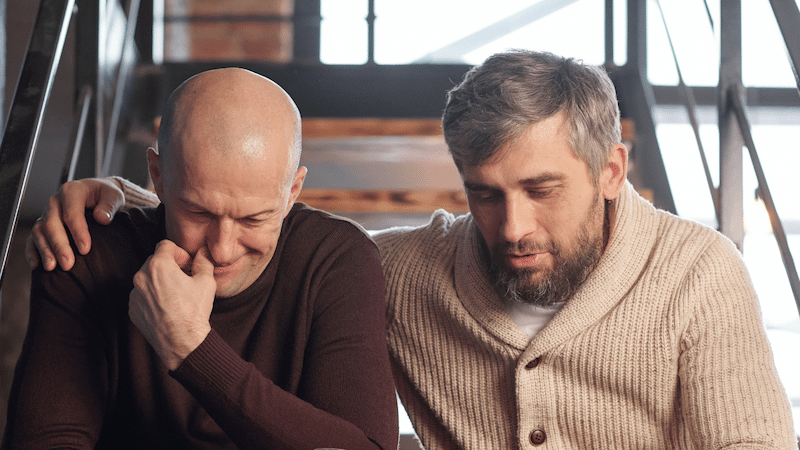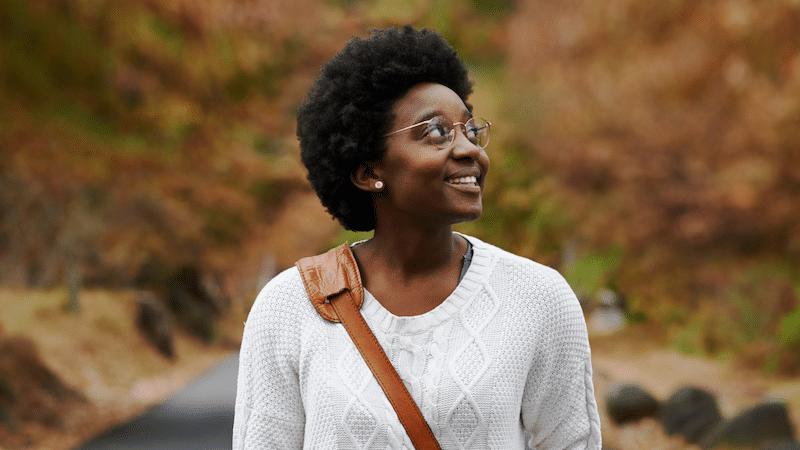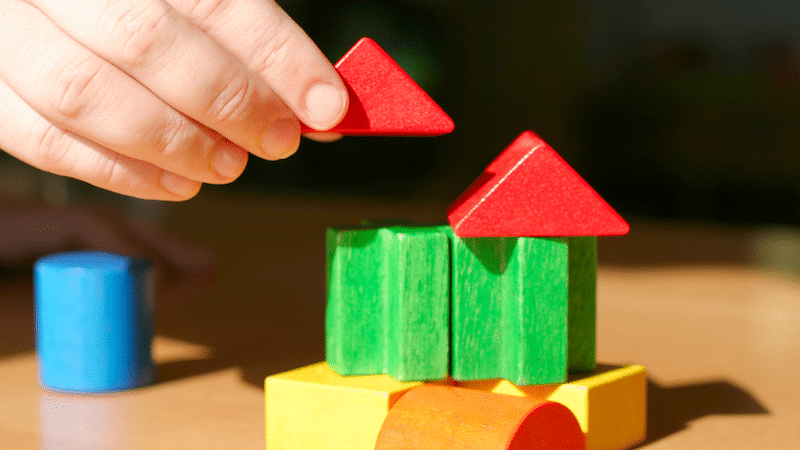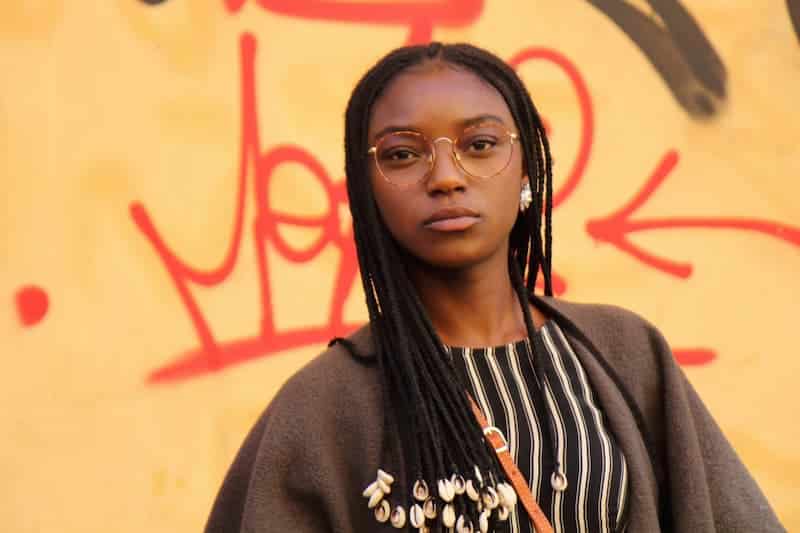How Loved Ones Responded To Male Survivors & How They Wish They’d Responded

Survivors don’t always get the responses they deserve when they disclose. This can be especially true for survivors who do not fit the stereotypical image of a sexual assault survivor, such as male survivors. Hear four courageous men share how people in their lives responded when they disclosed to them, and how they wish they’d responded instead.
Steve Peacock
“Not only did I not necessarily understand what was done and that it was abuse and that it was going to have a lifetime ramifications, I also felt responsible. And I think as kids, I’ll just speak for myself, it may be similar for people who are older as well, but as kids, when you’re groomed, when you’re targeted in a way that makes you feel like you’re special, you become what you feel like an accomplice, you feel like you’re in this together.
And I can’t remember if it’s what he said or not. It’s possible. But I do remember, it was not like I wasn’t dragged over to his house or to my basement, I went freely. And that is something that really took a long time for me to realize what was done to me to bring me into that orbit and make me feel like I was participating. So it’s very very important for me to get to the point to realize, no, this was all him. He took advantage of me. He took advantage of my family’s trust and it was really very, very painful. Then, to come forward and say this was done to me. And I do want to acknowledge that I was just at my mom’s funeral this weekend. My family has, and I have built a much stronger relationship since my public disclosure in my 50’s.
And they were extremely supportive, including when his parents did also show up, again, as they were neighbors, at my mom’s service and reception. And as for how I wished it would happen, it’s simply what I said from the beginning. Just, it did. I got a second chance, and that was interacting with Alex, and just feeling the love, the conveying of, and accepting that I’m not alone, that we’ve all talked about, that it’s not my fault, that I’m not responsible, and true healing is possible. By the way, at that point in my life, I just thought there was going to be this dead part of me that I was going to live with for the rest of my life, and thank God that’s not the case.”
Jeff Dion
“I remember when I told my parents and it was all wrapped up in one thing. You know, my abuse led to all sorts of stuff. And I had to go tell my parents all at once that I was gay, I was getting divorced, and that I was abused as a kid. And they’re like, but you weren’t, right? And I’m like, yes, I was. But I wasn’t ready to talk more about that.
I think our conversation is so important for everybody else in the world because one of the things we know is, whenever someone discloses to that first person, how ever, the very first person they tell reacts can determine whether or not they ever tell anyone else ever.
Because all of this was sort of wrapped up and coming out at the same time, I had people say, Oh no, you’re not gay. You’re just, you know, re-perpetrating against yourself or something. I mean, it’s just all sorts of crazy stuff.
I think we just want people to say, I’m so sorry that that happened. And I wish I would have known and how can I help? I think that’s what our responses need to be. And I think every single one of us deals with that shame and that self blame because so often the abuse is not forced. Nobody, you know, it happens, but it’s very rare that someone is gonna grab a kid and drag him someplace and force this to happen. Yes, it does happen. But more often than not, a child is coerced. They’re groomed. It’s someone they know, someone they trust. And so then the child feels to blame because you’re saying, well, no one put a gun to my head and made me do this, right?
And as someone who also experienced abuse at two separate times for years, it was so much easier for me to talk about and disclose the abuse that happened at seven. When you’re seven, everybody’s bigger than you and you sort of feel a little more blameless.When I’m 15, it’s like, Ooh, you know, really, shouldn’t I have been more responsible? Shouldn’t I have known what was going on? But I was being misled and duped by a scout leader. So I had to come to terms that I should never been put in that position that, you know, I was coerced into that and I really have an awful lot of trauma, you know, that lives as a result of that.
And so I think part of it is there is part of that path of healing is forgiving ourselves. And absolving ourselves. And sometimes it’s also about absolving others around us. Not necessarily the perpetrator, but, you know, things we wanted or needed from people in our lives that didn’t give it to us because they didn’t know. And we didn’t have the words to ask for what we needed. But I think our Awareness has increased greatly.
We’ve talked about you know, Steve mentioned how I think he was 52 when he disclosed and that’s sort of the average age. And the good thing is, and it’s the average age for people our age. But one of the good things we’re seeing is that we’re bringing down that age of disclosure, which is so important because until we disclose, none of that trauma gets resolved.
And I say unresolved trauma is sort of like a wrecking ball, like your body’s a pinball machine, but instead of a pinball bouncing around, it’s a wrecking ball of trauma that’s just bouncing around in your life and wreaking havoc. And you don’t start to control that and you resolve that until you start to acknowledge it and get some help. And so the sooner we can get people to disclose this, then the sooner we can get them help. Because the longer that wrecking ball continues inside, the more damage it causes. And one, we don’t want kids to be abused, but two, if they are, we don’t want them to suffer through 30 or 40 years of unresolved trauma when we know there are interventions that we can help.”
Tim Lennon
“I grew up in an Irish Catholic family. There’s 12 of my family. Ten boys, two girls. And as I mentioned previously, I buried memories for many, many decades. And so I was in my 50’s or so before I told, well, before memories came forward and before I told any of my brothers and sisters. I told my parents who were immediately outraged, but I don’t believe we discussed anything after that.
I told each of my brothers and sisters individually. I didn’t want to make a grand announcement. I didn’t want to make it a big deal, but I did tell them. We were a very close family, or still are, and I told them individually, and I would say about half have been incredibly supportive for the last decade or so since I first disclosed to them.
But the other half were kind of an immediate, “that’s too bad.” “Oh, I’m sorry to hear that.” And that was the end of the conversation. And it was like some people just don’t have the ability to express any kind of sympathy. I mean, it’s so horrific, it’s so horrible, it’s so out of the norm in our polite society, and we grew up in a very narrow Catholic kind of family, you know, none of these things were ever discussed.
So when I disclosed I’ve got incredible support from four or five of my family, just absolutely incredible for decades. But for some, they’ll acknowledge it if the topic comes by in passing, but since the first disclosure till now, there’s never been any kind of disclosure or any kind of discussion. So it’s been sort of mixed and I sort of understand that it’s hard for people to talk about such cruelty to children. It’s just so outside the norm. People can’t comprehend it or can’t understand it. And I’m sort of sympathetic to that. That’s fine. That’s where they are.”
Yonah Kohn
“I grew up in a very traumatic home environment, not of sexual violence. There was just a lot going on. And, but I was always an eager, pleasing kid, you know, what they would call a goody-two-shoes, that sort of thing. And then up until, and then I changed schools in elementary school, and I was nervous. I was the new kid. I was in the middle of the year, and I come from a traumatic environment.
So I was always, you know, kept to myself, that sort of kid. And I didn’t know I was ripe for abuse, but I think any child is ripe for abuse with predators. But I had no understanding of what sex, like I had no sex ed, I had no understanding of what body parts are, and what can happen, and certain physical reactions does not mean that you enjoyed it, or that you liked it.
But there’s one story that I’ve shared publicly that I’m going to share now that sort of highlights my experience when it clicked into my brain as a kid that I was being abused or that I was being taken advantage, because at first I thought it was love, you know, that’s how it was conditioned to me. When I first realized, no, this isn’t love and I’m not feeling okay. And I need to tell someone. I did not feel comfortable telling my parents. So I figured, you know, I’ll tell my teacher that was sort of like my default.
I told my teacher, but I was being very, you know, beating around the bush, sort of insinuating, trying to put my hand around where certain things were happening. And I remember the moment it clicked in his brain, what I was saying and what I was insinuating. And essentially I was saying that another teacher who was acting as a default guidance counselor, he was not a guidance counselor, but he was sort of like, the teacher that everyone went to who had emotional problems.
When it clicked into his brain, what I was saying, he slapped me across the face and he said, we don’t talk about such things. That conditioning was not only because I knew as a child, I was like, do I talk? Do I not talk? It wasn’t just the violence. It was the conditioning of silence.
And so that is a lot of my history and a lot of my trauma and just, if I talk about it at any age, it was always the question, because I knew I was abused when I was 19, 20, 21, 22. You know, it’s not like at 33 all of a sudden I decided I remembered. But when I started speaking up, it was more about, will someone hit me if I say something?
That was the constant thing and how I wish anyone would have responded. Just let me speak. Let me talk. Let me get it. Let me share what I have to say because it is a brave and courageous act to speak up and again, I never had that opportunity.
And the one other thing I wish people wouldn’t do, and that is when I, and I feel a little different about this now when I have disclosed as an adult, I’m 42 now. I always get people responding to me based on how it impacts them. And the truth is when I disclose to a loved one or to anyone that I’m a survivor, I get that it’s going to impact them because, how can it not? Right. But if your sole response is how it impacts you and you have no compassion for me as a survivor, that’s where it irks me and really gets me upset. Don’t make [it about you], don’t be selfish.”
Answers have been slightly modified for grammar and readability.
Support Is Available

1 in 6
The mission of 1in6 is to help men who have had unwanted or abusive sexual experiences live healthier, happier lives. Our mission also includes serving family members, friends, partners, and service providers by providing information and support resources on the web and in the community.
Virtual Support Groups: Join a 1 in 6 Support Group here

MaleSurvivor
For 26 years, MaleSurvivor has fostered a healing community where tens of thousands of men from more than 200 countries come together to find support, information and — most importantly — hope.

MenHealing
We believe in men and their loved ones healing through community and relationships, fostering a sense of belonging, embracing vulnerability, and recognizing the pain and trauma that men experience. By supporting men to heal, we hope to help heal the world.



